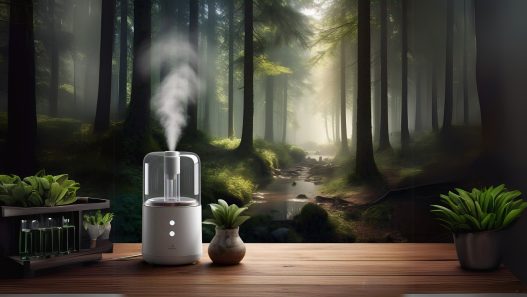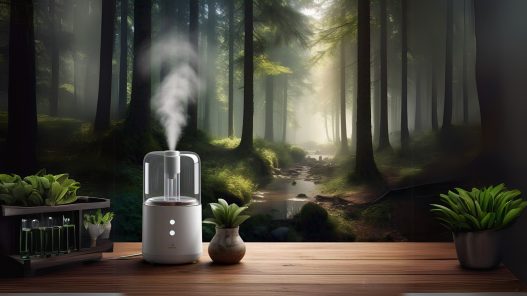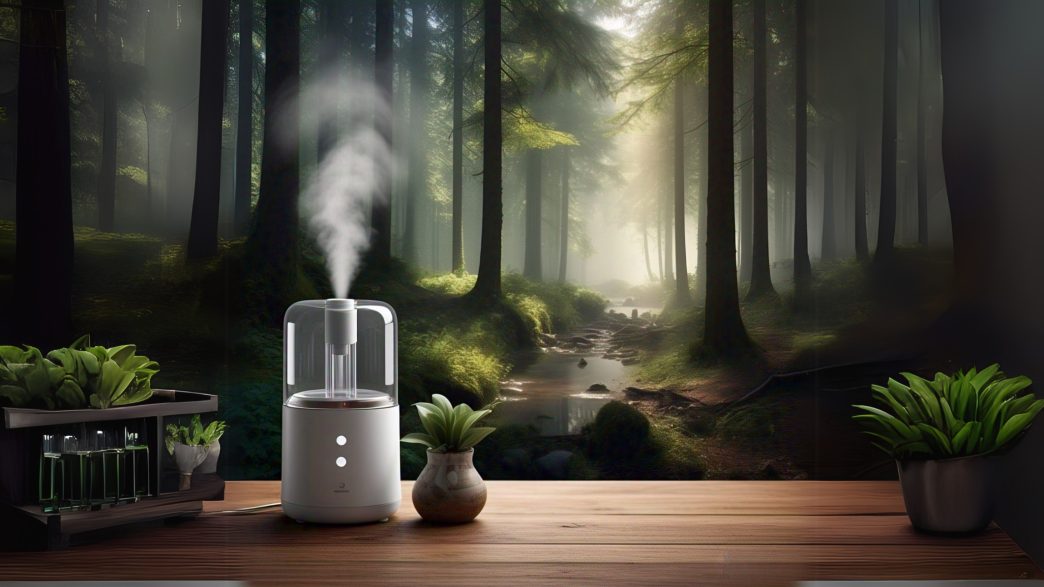Humidifiers, often seen as essential in homes during cold, dry months, are far more than just simple appliances—they play a pivotal role in maintaining optimal air quality and promoting a range of health benefits. From relieving dry skin to improving respiratory health and even enhancing sleep quality, these devices are often underestimated in their importance. However, behind their everyday usage lies fascinating science, fun facts, and a few myths worth busting. In this article, we will explore the in-depth science behind humidifiers, how they affect your health, and dispel some common misconceptions.
What Is Humidity and Why Is It Important?
Humidity refers to the amount of water vapor in the air. It’s usually measured as relative humidity (RH), which is a percentage showing how much moisture is in the air compared to the maximum amount the air could hold at a specific temperature. For example, at 100% RH, the air is fully saturated with water, meaning it can’t hold any more moisture.
In general, the ideal indoor humidity level is between 30% and 50%. This balance is crucial for both your health and the integrity of your home environment. When the humidity is too low, it can lead to dry skin, irritated eyes, and a dry throat. However, if the humidity is too high, it can encourage mold growth and dust mites, which are known allergens.
The Science of Humidifiers: How Do They Work?
At their core, humidifiers are devices designed to add moisture to the air to increase the humidity levels in a room. (Humidifiers 101: What They Are, How They Work, and Why You Need One)The science behind humidifiers involves the conversion of liquid water into vapor and then dispersing it into the environment. Here’s how different types of humidifiers achieve this:
- Evaporative Humidifiers:
- These work by drawing dry air through a wet filter. As the air passes through, the moisture evaporates and is blown into the room.
- Fun Fact: Evaporative humidifiers are self-regulating! As the air becomes more humid, the evaporative process slows down, preventing over-humidification.
- Ultrasonic Humidifiers:
- These use ultrasonic vibrations to create high-frequency sound waves that break water into tiny mist particles, which are then released into the air.
- Myth Burst: “Ultrasonic humidifiers produce harmful radiation.” This is a common misconception. The sound waves are simply vibrations that don’t affect your health—they’re not the same as harmful radiation from other sources.
- Steam Vaporizers:
- These use heat to boil water, turning it into steam, which is then cooled slightly before being released as a warm mist.
- Fun Fact: Some people prefer steam vaporizers because the warm mist can help soothe sore throats and promote better sleep.
- Impeller Humidifiers:
- These humidifiers use a rotating disk to break up the water into fine droplets, which are then dispersed into the air.
- Fun Fact: Impeller humidifiers are quiet, making them ideal for use in bedrooms, ensuring you don’t disturb your sleep while adding moisture to the air.
How Air Moisture Affects Your Health: The Benefits of Humidified Air
1. Respiratory Health
Dry air can wreak havoc on your respiratory system. In the winter months, indoor air tends to become very dry due to heating systems, which can cause the mucous membranes in your nose, throat, and lungs to dry out. This can result in discomfort, an increased risk of infections, and overall poor respiratory health. Humidifiers help by:
- Preventing Dry Sinuses: When the air is too dry, mucus in the sinuses becomes thicker, which can lead to nasal congestion and sinusitis. Humidified air keeps mucus thin and flowing, making it easier for your body to clear out irritants and pathogens.
- Easing Cold Symptoms: If you’re dealing with a cold, a humidifier can help relieve symptoms like a sore throat, dry cough, and congestion. It keeps the throat moist and helps to alleviate the inflammation caused by dry air.
- Soothing Asthma and Allergies: For asthma sufferers, humidified air can help keep the airways open and reduce the likelihood of asthma attacks. Moist air can also soothe allergic reactions caused by allergens like dust mites and pollen, which thrive in dry air.
2. Skin Health
Your skin is your body’s largest organ, and it requires moisture to remain healthy and protect against environmental stressors. Dry air, especially in winter, can cause your skin to lose moisture, leading to:
- Dryness and Flakiness: Low humidity levels can strip your skin of its natural oils, leaving it feeling tight, cracked, and itchy.
- Premature Aging: A lack of moisture in the air can also accelerate the appearance of fine lines and wrinkles, as dehydration leads to a loss of skin elasticity.
- Eczema and Dermatitis: People with eczema or dermatitis are especially vulnerable to flare-ups in dry conditions. Keeping the air moisturized with a humidifier can help reduce irritation and prevent the skin from drying out.
3. Improved Sleep Quality
Sleeping in an environment with dry air can cause discomfort that disrupts sleep. From dry throats to nasal congestion, these issues can leave you tossing and turning through the night. A humidifier can help by:
- Preventing Snoring: Dryness in the throat and nasal passages can lead to snoring, which disrupts sleep quality. Humidified air reduces the likelihood of throat dryness, making it easier to breathe through the night.
- Reducing Dry Mouth: Many people wake up with a dry mouth and throat when they sleep in dry conditions. Humidified air helps prevent these symptoms, ensuring a more comfortable and restful night.
4. Immune System Boost
Dry air can compromise your immune system by causing the mucous membranes in your nose and throat to dry out. This reduces their ability to trap and expel harmful bacteria and viruses. Keeping the air moist helps your immune system function more effectively by:
- Maintaining Mucus Production: When the mucous membranes remain moist, they can produce mucus more effectively, which traps dust, pollen, and germs.
- Lowering the Risk of Infections: Humidifiers can help reduce the risk of respiratory infections, especially during the cold winter months when viruses thrive in dry air.
5. Preservation of Furniture and Home Elements
It’s not just your body that benefits from proper humidity levels—your home does too. Wooden furniture, floors, and musical instruments can suffer from the effects of dry air. Here’s how:
- Protecting Wood Furniture: Dry air can cause wood to crack, warp, and shrink. By maintaining a consistent humidity level in your home, you can preserve the quality of your wooden furniture, floors, and cabinetry.
- Maintaining Musical Instruments: Instruments like pianos, violins, and guitars, which are made from sensitive materials like wood and strings, benefit from a stable environment. A humidifier can help prevent cracking and warping, ensuring your instruments stay in tune and play beautifully.
6. Supporting Indoor Plants
Certain indoor plants, like orchids, ferns, and palms, thrive in humid environments. Dry air can cause them to wilt or dry out, leading to poor health. A humidifier helps maintain the right moisture level in the air, ensuring that your plants stay vibrant and healthy.
Fun Facts and Myth Busting
Fun Fact 1: Humidifiers Can Help Reduce Static Electricity
- Low humidity causes static electricity to build up, leading to annoying shocks when you touch metal objects or even your computer keyboard. By maintaining humidity levels in your home, you can reduce static electricity and the discomfort that comes with it.
Fun Fact 2: Not All Humidifiers Are Created Equal
- Some humidifiers have built-in air purifiers that remove dust, allergens, and bacteria from the air while adding moisture. This dual-action helps create an even healthier indoor environment.
Myth Busting:
- Myth 1: “Humidifiers Are Only Necessary in Winter.”
- While it’s true that winter is often the driest season, humidifiers can be beneficial year-round. In summer, air conditioning can also dry out indoor air, making humidifiers useful during warmer months too.
- Myth 2: “Humidifiers Make the Air Too Damp.”
- Over-humidification is possible, but it’s easy to avoid with modern humidifiers. Many devices come with humidistats to monitor and regulate humidity levels, preventing excessive moisture buildup.
- Myth 3: “Humidifiers Cause Mold.”
- While humidifiers can promote mold growth if used improperly, the risk is low if you maintain your device properly. Regular cleaning and monitoring of humidity levels will prevent mold issues.
Choosing the Right Humidifier for Your Health
To maximize the benefits of a humidifier, it’s essential to choose the right one for your needs. Consider the following:
- Room Size: Select a humidifier that’s suitable for the size of your room. Larger rooms require more powerful units.
- Noise Levels: If you plan to use the humidifier in your bedroom, look for a model with quiet operation.
- Cleaning Needs: Regular cleaning is crucial to prevent bacteria and mold buildup. Choose a humidifier with a design that’s easy to clean.
- Additional Features: Some humidifiers come with air purifiers, essential oil diffusers, or UV light sanitization, which can further improve air quality.
Conclusion: The Power of Humidified Air
Humidifiers are not just simple appliances—they’re powerful tools that can have a significant positive impact on your health, home, and comfort. By adding moisture to the air, they help maintain healthy skin, promote respiratory wellness, improve sleep quality, and even enhance the longevity of your furniture and plants. With the right humidifier, you can create a balanced indoor environment that fosters better health and well-being. Keep in mind the ideal humidity range, clean your humidifier regularly, and enjoy the many benefits of breathing in moist, clean air.












